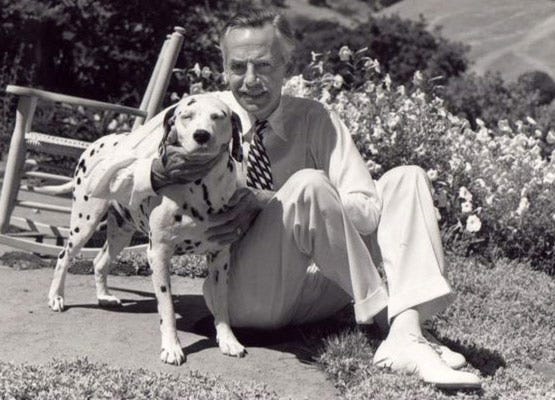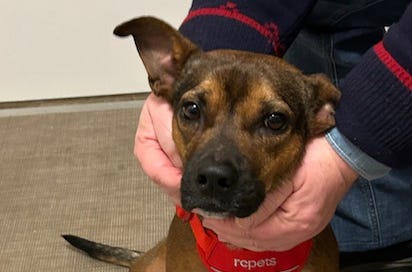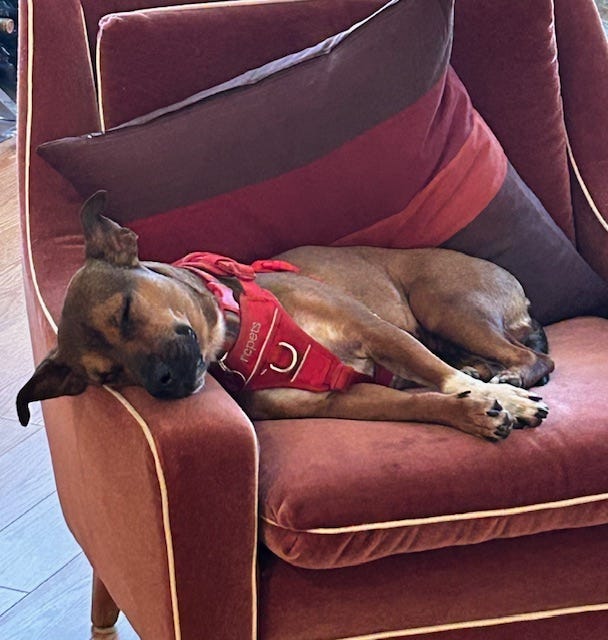25 Pounds of Hope
I can't be with the dog I love, ever again, but I can love the dog I'm with.
I was wrestling my new dog away from the stick she meant to eat when a voice boomed, “Cuteness overload!” No male stranger has ever seen cuteness in me, but Chica radiates it. Eyes with a lemme-at-it gleam. One white stocking. Ears that could be any mutt’s until excitement hoists them like sails.
I used to fantasize about a dog with big ears that caught the wind. But this dog? Not the one I had in mind.
It wasn’t that she peed on the Tibetan carpet, ran laps around the living room or had destroyed, in short order, two sets of coasters, the taffeta skirts of several chairs, a wool challis scarf, a TV blanket and my beloved crimson glasses frames, discontinued long ago. Nor was it her peremptory bark—paws firmly planted, gaze fixed on the closest human—when the attention offered fell short of her standard. “Give her time,” said experienced dog folk. “She’ll learn.” At doggie class she was the star. One smart pup, our Chica.
But I pined for Casey, the cheerful knucklehead whose scarred legs and torn right ear ensured that nobody would call him cute. Oh, he was handsome, in the knocked-about way of an old cowboy who had lost the odd tooth but not the killer smile. Street people cottoned to him. They seemed to know Chica was beyond their league.
There’s no emptiness like a collar without a dog to set the tags jingling. When Casey died two days before Christmas, I hung his red collar on the coat stand and set about cleansing every pocket and purse of his treats. Just when I thought the last trace was gone, one more seam released a dusting of crushed mini-trainers.
We meant to give ourselves at least a year between dogs. Dog-free, we’d travel farther, stay longer. A leisurely swing through Japan and South Korea. Winter in Portugal. Weeks passed without the seed of a plan. Empty peanut butter jars went unlicked. Fallen blueberries lay untouched at my feet. No trip is complete without a home to call me back. But home wasn’t home without a dog to follow the sun around, imprinting every tried-and-true spot with his warmth and a few ginger hairs.
We’d been combing Petfinder for maybe a week when a photo popped up of a recent rescue from Antigua. Talk about attitude: front paws on the kitchen counter, ears flared in expectation of her due. Casey would go along to get along; this diva had other ideas. Four years old, so the agency said (as if they could know with an abandoned dog). Twenty-five pounds, just under our condo’s size limit. Not much by way of description: “She is the sweetest. She deserves the best.” I detected an edge to her sweetness but I liked her spark.
Paul preferred the fulsome profile of another dog whose keepers had yet to answer our inquiry. We figured he was taken. The diva, then known as Chichi, was still on offer, and we were first in line. Best not to drag our feet. When we collected her at the foster home, she bounced and twirled and wagged all the way to the car. She lit something in me that went out when Casey died. “She is a delight,” Paul said.
It was February 25. Nine weeks and one day after the vet, her eyes shining with tears, held me in her arms and said, “He was a well-loved dog.”

When Eugene O’Neill lost the beloved Dalmatian Silverdene Emblem, known as Blemie, his devastated wife thought that she was done with dogs. The playwright channeled their grief into a literary tour de force, “The Last Will and Testament of an Extremely Distinguished Dog,” in which Blemie offers his last request: The O’Neills must have another dog:
“It would be a poor tribute to my memory never to have a dog again. What I would like to feel is that, having once had me in the family, now she cannot live without a dog! I have never had a narrow jealous spirit.”
Blemie did have firm views on his successor. Only a Dalmatian would do, and the finest of the breed would have to know his place in the hearts of the O’Neills:
“He can hardly be as well bred or as well mannered or as distinguished and handsome as I was in my prime…. But he will do his best, I am sure, and even his inevitable defects will help by comparison to keep my memory green. To him I bequeath my collar and leash and my overcoat and raincoat, made to order in 1929 at Hermes in Paris. He can never wear them with the distinction I did, walking around the Place Vendôme, or later along Park Avenue, all eyes fixed on me in admiration; but again I am sure he will do his utmost not to appear a mere gauche provincial dog…. He will, I presume, come closer to jack rabbits than I have been able to in recent years. And for all his faults, I hereby wish him the happiness I know will be his in my old home.”
Casey loved his home for nine and a half years. To him it was perfect just as it was, despite the misbegotten electric fireplace and the popcorn ceiling we should have replaced long ago. He had the run of our condo, with one exception: the Caravaggio chair, so named for the coffee-table art book, Discovering Caravaggio, that I would place on the seat to keep him off the rose velvet, unblemished until he took his claws to it. The Caravaggio chair encircles a smallish dog and affords a prime view of human comings and goings. When Chica made a beeline for it, I shooed her away.
Paul said, “What’s your problem? The damage is done, and she’s happy there. If it had been up to me, Casey would have sat there too.”
Happy dogs make people happy. Casey taught me that, or so I thought. But all along there was something I denied him.
When Paul talked me into adopting Casey, I doubted I could love any dog. The sheer amazement of falling for this everymutt—neither big nor little, dark nor light—was part of the joy that flooded me on day one. Chica’s spirit blazed from her photo. How could I not be smitten? In a word: Casey. Everything she did or didn’t do reminded me that she was not the adored one.
Chica deigned to nibble a banana chunk. Casey caught his in midair and downed it in one gulp.
Chica opened the bedroom door on her first try, nine days in. Casey, my doofus, took nine years.
Chica had it rough in Antigua. Left tied to a tree. Spayed while pregnant at a clinic that did not lavish TLC on charity cases.
Chica had her first checkup at Casey’s old clinic. When the vet brought out the stethoscope, she hid behind a chair. Casey loved that clinic for butt scratches and endless liver treats. He objected to the presence of interloper dogs in his domain. Now I sat with Chica in the room where he took his last breath. And I pictured the stethoscope against his heart. Heard the words I had been dreading: “He’s gone.”
I’ve often wondered how a person can fall in love again without diminishing the love she lost. When a friend was widowed after decades of rewarding marriage, grief laid her low. Then she met a kind and seasoned man who released the lightness in her.
On Facebook she glows beside Husband Number Two. Similar shots honor Husband Number One on his birthday in their youth. Time has had its way with her face, but there’s no beauty like happiness reclaimed.
“You must be madly in love with your new doggo,” people say. I doubt we’ll ever get to “madly.” That was for Casey, my first dog. This new love is like the magnolia buds of Chica’s first, cold spring with us. Not ready to bloom but swelling. If my friend can love another spouse, I can love my gallant successor dog.
Someone must have hurt Chica in Antigua. He has a double or two in our downtown neighborhood—lean and hunched, with the broken-puppet gait of drug abusers. At the sight of such a man, Chica erupts. Her frantic baying won’t subside until he’s long out of view. Everybody else gets the hey-friend treatment that kept her fed on the street. Paws up, muzzle lifted for a smooch.
Othello says of Desdemona, “She loved me for the dangers I had passed.” That’s how I feel about Chica. Her DNA test says she’s 80 percent village dog, an ancient, genetically distinct canine type that accounts for most of the world’s billion dogs but just 1 percent of dogs tested by Embark, which prepared Chica’s profile. Nature designed village dogs to live near humans, learn human ways and survive the worst that humans can dish out.
I look up from my grilled cheese sandwich to see Chica snoozing in the Caravaggio chair—muzzle resting on its velvet arm, one eye half open. At the least rattle from the kitchen, she’ll come running for the scrap of goodness that cannot fail to be at hand.
I choose not to see the latest stain she has left on the carpet, a dark reproach that has withstood two attacks with the magic spray. Just when we think she’s learned the rules, she decides to have her way one more time. “The princess and the pee,” Paul says. Had I known about her devil-may-care toilet habits, I might have held out for a different dog. At least Chica doesn’t drool all over the kitchen floor. More than once, Casey’s drool nearly sent me flying.
Chica stretches in her sleep. Cathedral bells chime the hour; sunlight warms the room. Home is where the dog is. If I wanted a shipshape home, I wouldn’t have a dog.
Have you found a new love after mourning a lost one, any species? Tell us about it. I watch for your insights and stories, and answer every one. I’m proud to host one of the liveliest comment sections around. Make yourself at home and chime in.
After Casey died, my first act was writing his obituary in a burst of inspiration. Every word came to me like a gift from whatever gods there be. I’ve just posted his tribute here. Over here, in one of my most popular posts, I wrote about celebrating Casey’s presence in his last months. Take a good look at the painting by Rodolfo Morales, a Mexican artist. The dogs are clearly village dogs. When I wrote this essay, I had never heard of them—and never dreamed one was headed my way.
My essays are free to read and share. I’m here to create a community, not a private club. A few readers of heart and means have chosen to support me with paid subscriptions for sheer love of my writing. I can’t overstate the surge of gratitude every time someone steps forward.
My mentor used to tell me, with a smile of anticipation, “I wonder what you’ll say next.” Me too. Why don’t you stop by in a week and find out?








LOVE this so much. Yes, I've had at least one dog in my life from the age of 22. In the last 10 years or so, I've moved to two at the same time. In 2018, I lost Hazel, at 5 years old, due to congenital issues that couldn't be helped. 5 years old. I have her little brother, Hugo, who will be 11 this summer. I adopted Maisy 3 weeks after Hazel died. She's so different; Hazel's exact opposite in many ways. Skittish and timid versus Hazel's take charge alpha funny personality. And I adore her. And daily, I miss Hazel, who made me laugh like no other dog who's shared my home. Even when they die, they don't leave, so 7 years after the loss, the sadness has dimmed, but the love has survived. And they're all so different, one from the other, and I cherish those differences. They are unique. xo
Loved the photo of Chica on the chair!